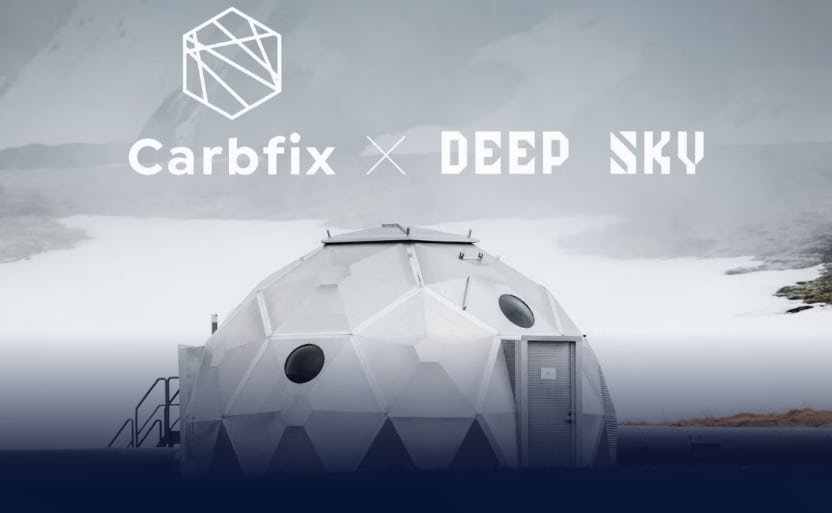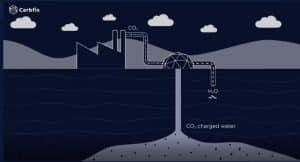Deep Sky, a carbon removal project developer based in Montreal, and Carbfix, the world’s first operator of CO2 mineralization, have partnered to investigate CO2 mineral storage in Canada.
The press release mentions the pre-feasibility study examining potential reservoirs in Quebec for CO2 mineral storage will conclude in June.
The Role of Deep Sky
Deep Sky, renowned for its commitment to developing cutting-edge environmental technologies aims to revolutionize carbon capture and storage practices with this groundbreaking project.
Phil De Luna, Chief Carbon Scientist, Head of Engineering at Deep Sky noted,
At Deep Sky, we’re constantly on the lookout for new technologies that can capture carbon dioxide from the air or the ocean. The principle of engineered carbon dioxide removal (CDR) is relatively simple, separating a gas (CO2) from other gases (air) at very low concentrations. However, there are myriad ways and chemistries to make that separation happen.
RELATED: Deep Sky and Svante Partner for Gigaton-Scale CDR in Canada (carboncredits.com)
Understanding CO2 Mineralization
CO2 mineralization, also known as carbon capture and storage (CCS) through mineralization. It involves the conversion of CO2 into stable mineral forms through chemical reactions with certain rocks. This process mimics and accelerates the natural geological carbon sequestration process, locking away CO2 for thousands of years.
Notably, Carbfix is a pioneer in “converting CO2 into stone”. The unique technique involves injecting CO2 into basaltic rock formations. Subsequently, reacting with minerals to form stable carbonates, effectively trapping the CO2 underground.
According to Carbfix, the company has injected 103, 273.5 MTs of CO2 since 2014.
It believes Europe alone can “theoretically” store at least 4,000 billion tons of CO2 in rocks while the United States can store at least 7,500 billion tons.
source: Carbfix
Let’s understand how the joint venture will help implement the process.
Project Implementation
In this partnership, the companies will screen geological and geochemical data of the selected subsurface. They will conduct laboratory work on ultramafic rock formations in various Quebec regions of Canada.
The CO2 mineralization storage project will involve the following key steps:
1. Site Selection: Identifying suitable basaltic rock formations for CO2 injection based on geological characteristics and proximity to emission sources.
2. Injection Process: Injecting CO2 captured from industrial sources into the selected basaltic reservoirs at controlled pressures and temperatures to initiate the mineralization reaction.
3. Monitoring and Verification: Implementing rigorous monitoring and verification protocols to assess the effectiveness of CO2 mineralization, track carbon storage volumes, and ensure the long-term integrity of storage sites.
4. Scaling Up: Scaling up the project to demonstrate its feasibility for large-scale deployment across various industrial sectors and geographical regions.
Subsequently, this data will assess the formations’ potential for in-situ carbon mineralization and safe, permanent CO2 sequestration. This is how their unique process transforms CO2 into stone underground within a couple of years.
Image of CO2 mineralization at an industrial scale
Source: Carbfix
Potential Impact of Deep Sky-Carbfix Collaboration
The successful implementation of the Deep Sky-Carbfix CO2 mineralization storage project holds immense promise for addressing the global climate crisis. Some key anticipated impacts include:
Carbon Emission Reduction: It can significantly reduce carbon emissions from industrial sources by capturing and storing CO2 in mineral form. Thereby helping to meet emission reduction targets outlined in international climate agreements.
Climate Mitigation: It would contribute to climate mitigation efforts by removing CO2 from the atmosphere and preventing its release. Thus, mitigating the adverse effects of global warming and climate change.
Technology Adoption: It can enhance the adoption of CO2 mineralization technology as a cost-effective and sustainable CCS solution across various industries.
The company aims to rapidly and permanently store one billion tons of CO2 (1GtCO2) to play a pivotal role in addressing the climate crisis.
Edda Aradottir, Carbfix CEO commented,
“Our partnership with Deep Sky demonstrates Carbfix’s dedication to pioneering sustainable value chains and solutions for safe and permanent carbon storage. This collaboration in Québec is a key step towards realizing global net-zero ambitions, illustrating our shared commitment towards climate recovery.”
By partnering with Carbfix, we believe Deep Sky has combined its innovative approach with the former’s state-of-the-art CO2 mineralization technology.
FURTHER READING: Deep Sky & Mission Zero Partner to Turn Canada into A Carbon Removal Hub (carboncredits.com)



